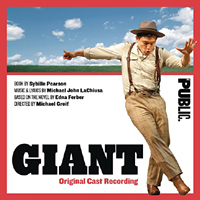 Original Off-Broadway Cast, 2013 (Ghostlight)
Original Off-Broadway Cast, 2013 (Ghostlight)  (4 / 5) Texas is big. Edna Ferber’s 1952 novel, Giant, is big, spanning decades and two generations of rancher families. The 1956 movie version is big, with spurting oils wells and thundering cattle herds (plus a stunning young Liz Taylor and a sultry James Dean). How to translate something so gigantic to the stage? By going big with the score. Giant may not be Michael John LaChiusa’s most important musical, but it’s his most melodic, alternately sweeping and introspective. This recording is jam-packed with 26 songs from the three-hour show: Mexican folk songs, country hoedowns, ballads of hope and regret, swing, and early rock. (LaChiusa subtly mirrors changing musical tastes as the story moves from 1925 to 1952.) Linking the various parts of the whole is the anthem “Heartbreak Country,” for at its heart, Giant is the tale of that land — the Reata Ranch — and how it changed through the years, affecting everyone connected with it. At the center is the owner, Bick Benedict (the wonderful Brian D’Arcy James), who, like his older sister Luz (Michele Pawk), loves Reata and is always aware of his obligation to “take care of the land.” Yet, instead of marrying the daughter of a neighboring ranch owner, he weds an educated Virginian, Leslie (Kate Baldwin). LaChiusa chronicles their relationship in nine telling numbers. “Your Texas” is about Leslie’s dreams during their courtship, including a kind of frontier utopia. The lilting “Did Spring Come To Texas?” reveals Bick’s joy at their wedding. Things don’t always run smoothly, not with Luz’s interference and sexy mechanic Jett (PJ Griffith) hanging around; but there is genuine love here, and Bick and Lesie try repeatedly to work out their differences (“Heartbreak Country,” “Topsy Turvy”). A major issue is the treatment of the Mexicans who work the ranch, once Mexican property (“Aurelia Dolores”). The racism appalls Leslie, and her views are shared by the couple’s bookish son, Jordy (Bobby Steggart), who loves Juana (Natalie Cortez). Things reach a crisis in the climactic “The Desert,” a musical sequence (with dialogue by librettist Sybille Pearson) that’s a mini-play in itself. Others — there are nearly a dozen significant characters — play their roles in this changing Texas. Griffith works hard to distance himself from Dean’s iconic portrayal; his rock growl helps. Pawk’s Luz is perhaps overly villainous in “No Time For Surprises,” but fares better in her duets with Bick. John Dossett and Katie Thompson each get strong solos as Bick’s uncle and the girl Bick jilted for Leslie. The younger generation — Steggert, Cortez, Miguel Cervantes, and Mackenzie Mauzy — have their own chances to shine as well, notably in the bouncy “Jump” and the tender “There Is A Child.” This is a rich, vibrant score, loaded with emotion and power. — Laura Frankos
(4 / 5) Texas is big. Edna Ferber’s 1952 novel, Giant, is big, spanning decades and two generations of rancher families. The 1956 movie version is big, with spurting oils wells and thundering cattle herds (plus a stunning young Liz Taylor and a sultry James Dean). How to translate something so gigantic to the stage? By going big with the score. Giant may not be Michael John LaChiusa’s most important musical, but it’s his most melodic, alternately sweeping and introspective. This recording is jam-packed with 26 songs from the three-hour show: Mexican folk songs, country hoedowns, ballads of hope and regret, swing, and early rock. (LaChiusa subtly mirrors changing musical tastes as the story moves from 1925 to 1952.) Linking the various parts of the whole is the anthem “Heartbreak Country,” for at its heart, Giant is the tale of that land — the Reata Ranch — and how it changed through the years, affecting everyone connected with it. At the center is the owner, Bick Benedict (the wonderful Brian D’Arcy James), who, like his older sister Luz (Michele Pawk), loves Reata and is always aware of his obligation to “take care of the land.” Yet, instead of marrying the daughter of a neighboring ranch owner, he weds an educated Virginian, Leslie (Kate Baldwin). LaChiusa chronicles their relationship in nine telling numbers. “Your Texas” is about Leslie’s dreams during their courtship, including a kind of frontier utopia. The lilting “Did Spring Come To Texas?” reveals Bick’s joy at their wedding. Things don’t always run smoothly, not with Luz’s interference and sexy mechanic Jett (PJ Griffith) hanging around; but there is genuine love here, and Bick and Lesie try repeatedly to work out their differences (“Heartbreak Country,” “Topsy Turvy”). A major issue is the treatment of the Mexicans who work the ranch, once Mexican property (“Aurelia Dolores”). The racism appalls Leslie, and her views are shared by the couple’s bookish son, Jordy (Bobby Steggart), who loves Juana (Natalie Cortez). Things reach a crisis in the climactic “The Desert,” a musical sequence (with dialogue by librettist Sybille Pearson) that’s a mini-play in itself. Others — there are nearly a dozen significant characters — play their roles in this changing Texas. Griffith works hard to distance himself from Dean’s iconic portrayal; his rock growl helps. Pawk’s Luz is perhaps overly villainous in “No Time For Surprises,” but fares better in her duets with Bick. John Dossett and Katie Thompson each get strong solos as Bick’s uncle and the girl Bick jilted for Leslie. The younger generation — Steggert, Cortez, Miguel Cervantes, and Mackenzie Mauzy — have their own chances to shine as well, notably in the bouncy “Jump” and the tender “There Is A Child.” This is a rich, vibrant score, loaded with emotion and power. — Laura Frankos
Monthly Archives: October 2016
Dogfight
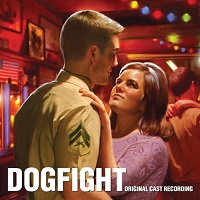 Original Off-Broadway Cast, 2013 (Ghostlight)
Original Off-Broadway Cast, 2013 (Ghostlight)  (3 / 5) Many musical scores can stand perfectly well as cast recordings, separate from their staged productions. Others lose something when deprived of the character and plot development revealed in the shows’ libretti. For all its virtues, Dogfight — songs by Benj Pasek and Justin Paul, book by Peter Duchan — falls within the latter group. Based on the 1991 film, it’s the story of some Marines tearing up San Francisco in late 1963, the night before they ship out to Vietnam. They plan a “dogfight,” a contest in which each jarhead contributes fifty bucks to a kitty that will be won by the guy who brings the ugliest date to the party. A nasty game, indeed — and the boys, including lead Eddie Birdlace (Derek Klena), appear as insensitive, hot-blooded louts. Fresh out of boot camp and convinced that they’re invincible, their pickup lines in the song “Hey, Good-Lookin'” are lies and braggadocio. Eddie finds a waitress, Rose (the sweet-voiced Lindsay Mendez), and pressures her to “Come to a Party” while privately exulting over his chances of winning the dogfight. Rose, for her part, is thrilled to be going out with a boy; in “Nothing Short of Wonderful,” she dithers over what to wear in staccato phrases, sounding like a mashup of Cinderella and the Baker’s Wife from Into The Woods. (The opening vamp of the title song also echoes that Sondheim show.) Clearly, this evening will not go well for Rose. But, sometime between the invitation and the party, Eddie has a change of heart that isn’t part of the score, although it’s described in the recording notes. The libretto shows us how Eddie grows to like Rose as they walk to the party, but none of that is in the score; on the album, he jumps from acting like a complete cad to trying unsuccessfully to take Rose home before the judging, in order to save her the embarrassment. Similarly, the recording doesn’t include Eddie’s later apology or indicate how the relationship progresses. Still, there’s much to appreciate here. Pasek and Paul know how to craft effective theater songs with nuance and layers. A few of the lyrics are a little too facile in telegraphing emotions or a sense of time and place, but most are very well written. The music ranges from early-sixties pop to Rose’s folk songs and powerful, revealing character numbers. “Come to a Party” works on multiple levels as variously sung by the callous Marines, the naive Rose, or Marcy, a knowing prostitute (played with sledgehammer bluntness by Annaleigh Ashford). The boys’ cockiness is evident as they take the town in “Some Kinda Time” and plan their big homecoming in “Hometown Hero’s Ticker Tape Parade.” Reality shatters their hopes, and Eddie’s devastating “Come Back” portrays what the war has done to him. But Rose is the real star here, and her journey comes through best in the score. She’s alternately shy and manic at first, then furious at the “Dogfight,” and soul-searching in “Pretty Funny.” The show’s emotional crux is found in her song “Before It’s Over,” when she realizes she has somehow benefited from the dreadful experience. As noted above, Eddie’s character growth isn’t charted as well in the songs, but this is still a solid score that tells a compelling story. — Laura Frankos
(3 / 5) Many musical scores can stand perfectly well as cast recordings, separate from their staged productions. Others lose something when deprived of the character and plot development revealed in the shows’ libretti. For all its virtues, Dogfight — songs by Benj Pasek and Justin Paul, book by Peter Duchan — falls within the latter group. Based on the 1991 film, it’s the story of some Marines tearing up San Francisco in late 1963, the night before they ship out to Vietnam. They plan a “dogfight,” a contest in which each jarhead contributes fifty bucks to a kitty that will be won by the guy who brings the ugliest date to the party. A nasty game, indeed — and the boys, including lead Eddie Birdlace (Derek Klena), appear as insensitive, hot-blooded louts. Fresh out of boot camp and convinced that they’re invincible, their pickup lines in the song “Hey, Good-Lookin'” are lies and braggadocio. Eddie finds a waitress, Rose (the sweet-voiced Lindsay Mendez), and pressures her to “Come to a Party” while privately exulting over his chances of winning the dogfight. Rose, for her part, is thrilled to be going out with a boy; in “Nothing Short of Wonderful,” she dithers over what to wear in staccato phrases, sounding like a mashup of Cinderella and the Baker’s Wife from Into The Woods. (The opening vamp of the title song also echoes that Sondheim show.) Clearly, this evening will not go well for Rose. But, sometime between the invitation and the party, Eddie has a change of heart that isn’t part of the score, although it’s described in the recording notes. The libretto shows us how Eddie grows to like Rose as they walk to the party, but none of that is in the score; on the album, he jumps from acting like a complete cad to trying unsuccessfully to take Rose home before the judging, in order to save her the embarrassment. Similarly, the recording doesn’t include Eddie’s later apology or indicate how the relationship progresses. Still, there’s much to appreciate here. Pasek and Paul know how to craft effective theater songs with nuance and layers. A few of the lyrics are a little too facile in telegraphing emotions or a sense of time and place, but most are very well written. The music ranges from early-sixties pop to Rose’s folk songs and powerful, revealing character numbers. “Come to a Party” works on multiple levels as variously sung by the callous Marines, the naive Rose, or Marcy, a knowing prostitute (played with sledgehammer bluntness by Annaleigh Ashford). The boys’ cockiness is evident as they take the town in “Some Kinda Time” and plan their big homecoming in “Hometown Hero’s Ticker Tape Parade.” Reality shatters their hopes, and Eddie’s devastating “Come Back” portrays what the war has done to him. But Rose is the real star here, and her journey comes through best in the score. She’s alternately shy and manic at first, then furious at the “Dogfight,” and soul-searching in “Pretty Funny.” The show’s emotional crux is found in her song “Before It’s Over,” when she realizes she has somehow benefited from the dreadful experience. As noted above, Eddie’s character growth isn’t charted as well in the songs, but this is still a solid score that tells a compelling story. — Laura Frankos
The Scottsboro Boys
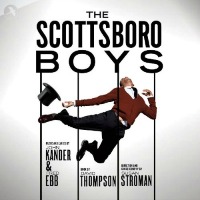 Original Off-Broadway Cast, 2010 (JAY)
Original Off-Broadway Cast, 2010 (JAY)  (5 / 5) In several of their shows, John Kander and Fred Ebb have used various types of entertainment as the contextual setting for exploring historical and social issues. In Cabaret, sleazy nightclub routines parallel the excesses of Weimar Germany and the rise of Nazism; Chicago‘s vaudeville acts reveal the corrupt justice system of the Roaring Twenties. In The Scottsboro Boys, the tragic story of nine young African Americans who were unjustly accused of raping two white women in 1931 is told in the form of a minstrel show. The result is a searing, brilliant work with depth, power, and guts. Kander says they chose the format for the opportunities it provided: an ensemble, led by an Interlocutor (John Cullum), telling stories, jokes and songs. Mr. Bones and Mr. Tambo (the versatile Colman Domingo and Forrest McClendon) assist by playing multiple characters (“White men’s our speciality”). Needless to say, the minstrel show itself is a stark reminder of racism, reinforcing social injustice with every number. In the rousing opener, the lead among the accused men, Haywood Patterson (the impressive Brandon Victor Dixon), asks “This time, can we tell it like it really happened?” The Interlocutor benignly replies, “Of course.” Haywood’s resolve to tell the truth provides the score with a constant refrain, from his first defense (the Bert Williams style “Nothin'”) to the comic fable “Make Friends With the Truth” to “Zat So?” His defiant cry “You Can’t Do Me” sets up the boys’ refusal of the Interlocutor’s call for a cakewalk and a “happy ending,” subverting the minstrel show. The fates of the real-life Scottsboro Boys were anything but happy, but the final scene places their case in the broader context to the civil rights movement, giving a glimpse of a better future. The score also contains one of Kander & Ebb’s finest songs, the poignant “Go Back Home,” with a beautiful, wistful melody that reoccurs throughout the underscoring. (A bonus track has Kander performing the number.) Throughout the recording, Cullum shines as the unctuous Interlocutor, his genially racist attitude clear in “It’s Gonna Take Time” (cut from the subsequent Broadway production) and “Southern Days.” The Interlocutor misses Mammy’s ribs and mint juleps, but conveniently forgets the lynchings and cross-burnings. Domingo and McClendon’s talents are also evident throughout, especially when they assume the guises of the Attorney General and lawyer Samuel Liebowitz in savagely satirical numbers revealing Southern anti-Semitism and patronizing New York showmanship. (“Just ask my chauffeur, Rufus!”) Here was no easy subject, but this musical may be Kander and Ebb’s most important work; three years after the show opened, the Scottsboro boys were granted a posthumous pardon. — Laura Frankos
(5 / 5) In several of their shows, John Kander and Fred Ebb have used various types of entertainment as the contextual setting for exploring historical and social issues. In Cabaret, sleazy nightclub routines parallel the excesses of Weimar Germany and the rise of Nazism; Chicago‘s vaudeville acts reveal the corrupt justice system of the Roaring Twenties. In The Scottsboro Boys, the tragic story of nine young African Americans who were unjustly accused of raping two white women in 1931 is told in the form of a minstrel show. The result is a searing, brilliant work with depth, power, and guts. Kander says they chose the format for the opportunities it provided: an ensemble, led by an Interlocutor (John Cullum), telling stories, jokes and songs. Mr. Bones and Mr. Tambo (the versatile Colman Domingo and Forrest McClendon) assist by playing multiple characters (“White men’s our speciality”). Needless to say, the minstrel show itself is a stark reminder of racism, reinforcing social injustice with every number. In the rousing opener, the lead among the accused men, Haywood Patterson (the impressive Brandon Victor Dixon), asks “This time, can we tell it like it really happened?” The Interlocutor benignly replies, “Of course.” Haywood’s resolve to tell the truth provides the score with a constant refrain, from his first defense (the Bert Williams style “Nothin'”) to the comic fable “Make Friends With the Truth” to “Zat So?” His defiant cry “You Can’t Do Me” sets up the boys’ refusal of the Interlocutor’s call for a cakewalk and a “happy ending,” subverting the minstrel show. The fates of the real-life Scottsboro Boys were anything but happy, but the final scene places their case in the broader context to the civil rights movement, giving a glimpse of a better future. The score also contains one of Kander & Ebb’s finest songs, the poignant “Go Back Home,” with a beautiful, wistful melody that reoccurs throughout the underscoring. (A bonus track has Kander performing the number.) Throughout the recording, Cullum shines as the unctuous Interlocutor, his genially racist attitude clear in “It’s Gonna Take Time” (cut from the subsequent Broadway production) and “Southern Days.” The Interlocutor misses Mammy’s ribs and mint juleps, but conveniently forgets the lynchings and cross-burnings. Domingo and McClendon’s talents are also evident throughout, especially when they assume the guises of the Attorney General and lawyer Samuel Liebowitz in savagely satirical numbers revealing Southern anti-Semitism and patronizing New York showmanship. (“Just ask my chauffeur, Rufus!”) Here was no easy subject, but this musical may be Kander and Ebb’s most important work; three years after the show opened, the Scottsboro boys were granted a posthumous pardon. — Laura Frankos
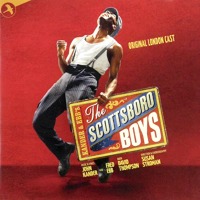 London Cast, 2014 (JAY)
London Cast, 2014 (JAY)  (4 / 5) This cast album bears a close similarity to the 2010 version. Three of the principals crossed the Atlantic to appear in the London production of The Scottsboro Boys: Brandon Victor Dixon as Haywood Patterson, Colman Domingo as Mr. Bones, and Forrest McClendon as Mr. Tambo. Dixon may even be better here, displaying heightened exuberance in “Commencing in Chattanooga” and enormous inner strength in “You Can’t Do Me.” The ensemble numbers sound more polished, and there are some lyric changes, notably in “Make Friends With the Truth.” There’s also a bit of additional dialogue, with more details about the fate of these young men. The Interlocutor’s solo, “It’s Gonna Take Time,” was cut from the Broadway production and is absent here, but the exit music is included. Like the earlier recording, there’ a bonus track of “Go Back Home,” here performed by Dixon. A key difference between the two albums is the Interlocutor, played nastily here by Julian Glover. Where John Cullum was generally sly, Glover is more commanding, sending chills as he insists, “Shake those tambourines!” When he describes himself as “the master of these folks” in the opener, the listener can’t help thinking he means more than just master of ceremonies. Does a collector need both recordings? Probably not. But those considering staging the show may want the London one, which is closer to the licensed version. — L.F.
(4 / 5) This cast album bears a close similarity to the 2010 version. Three of the principals crossed the Atlantic to appear in the London production of The Scottsboro Boys: Brandon Victor Dixon as Haywood Patterson, Colman Domingo as Mr. Bones, and Forrest McClendon as Mr. Tambo. Dixon may even be better here, displaying heightened exuberance in “Commencing in Chattanooga” and enormous inner strength in “You Can’t Do Me.” The ensemble numbers sound more polished, and there are some lyric changes, notably in “Make Friends With the Truth.” There’s also a bit of additional dialogue, with more details about the fate of these young men. The Interlocutor’s solo, “It’s Gonna Take Time,” was cut from the Broadway production and is absent here, but the exit music is included. Like the earlier recording, there’ a bonus track of “Go Back Home,” here performed by Dixon. A key difference between the two albums is the Interlocutor, played nastily here by Julian Glover. Where John Cullum was generally sly, Glover is more commanding, sending chills as he insists, “Shake those tambourines!” When he describes himself as “the master of these folks” in the opener, the listener can’t help thinking he means more than just master of ceremonies. Does a collector need both recordings? Probably not. But those considering staging the show may want the London one, which is closer to the licensed version. — L.F.
Shrek
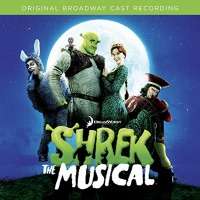 Original Broadway Cast, 2010 (Verve)
Original Broadway Cast, 2010 (Verve)  (3 / 5) Not to be outdone by Disney, the Dreamworks company decided to come to Broadway with a musical adaptation of its Oscar winning animated film Shrek, about an everyman ogre trying to maintain his peace of mind while wading through numerous fairy tales — some of which aren’t quite so magical. While the original Broadway production proved to be wildly over-produced and too loyal to the film in terms of its design and book, the cast recording reveals that, at its core, Shrek has considerable charm and a solid score aided by Danny Troob’s healthily full orchestrations. It’s not a surprise that composer Jeanine Tesori brought a mixture of earnestness and funky independence to the piece, but it is a surprise that first-time lyricist David Lindsay-Abaire crafted such well-structured and genuinely witty lyrics. The score boasts a fair number of highlights, such as “I Know It’s Today” and “When Words Fail,” though some songs try too hard for off-kilter humor — for example, “Story of My Life” and “What’s Up, Duloc?” In the title role, Brian d’Arcy James had to balance his own musical theater instincts with the burden of recreating a highly beloved film character; for the most part, he succeeded, especially in the touching “Who I’d Be.” Sadly, the talented Daniel Breaker was not given as much artistic freedom in the role of Shrek’s best friend Donkey, and instead offers an Eddie Murphy impression through much of this cast album. More successful principal players include Sutton Foster as not-your-average-princess Fiona, going toe to toe with James in the childishly gleeful “I Think I Got You Beat,” and Christopher Sieber as the hyper-sinister, height-challenged villain Lord Farquad. In their score, Tesori and Abaire gave Shrek a mischievous soul that was sadly lost among the giant scenery of the original production. Luckily, it’s captured here. — Matt Koplik
(3 / 5) Not to be outdone by Disney, the Dreamworks company decided to come to Broadway with a musical adaptation of its Oscar winning animated film Shrek, about an everyman ogre trying to maintain his peace of mind while wading through numerous fairy tales — some of which aren’t quite so magical. While the original Broadway production proved to be wildly over-produced and too loyal to the film in terms of its design and book, the cast recording reveals that, at its core, Shrek has considerable charm and a solid score aided by Danny Troob’s healthily full orchestrations. It’s not a surprise that composer Jeanine Tesori brought a mixture of earnestness and funky independence to the piece, but it is a surprise that first-time lyricist David Lindsay-Abaire crafted such well-structured and genuinely witty lyrics. The score boasts a fair number of highlights, such as “I Know It’s Today” and “When Words Fail,” though some songs try too hard for off-kilter humor — for example, “Story of My Life” and “What’s Up, Duloc?” In the title role, Brian d’Arcy James had to balance his own musical theater instincts with the burden of recreating a highly beloved film character; for the most part, he succeeded, especially in the touching “Who I’d Be.” Sadly, the talented Daniel Breaker was not given as much artistic freedom in the role of Shrek’s best friend Donkey, and instead offers an Eddie Murphy impression through much of this cast album. More successful principal players include Sutton Foster as not-your-average-princess Fiona, going toe to toe with James in the childishly gleeful “I Think I Got You Beat,” and Christopher Sieber as the hyper-sinister, height-challenged villain Lord Farquad. In their score, Tesori and Abaire gave Shrek a mischievous soul that was sadly lost among the giant scenery of the original production. Luckily, it’s captured here. — Matt Koplik
Curtains
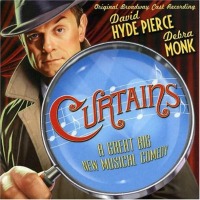 Original Broadway Cast, 2007 (Manhattan Records)
Original Broadway Cast, 2007 (Manhattan Records)  (2 / 5) Part backstage satire and part whodunit, Curtains was a long-gestating property. At the time of its opening, the show was touted as having the last original score by the legendary team of lyricist Fred Ebb, who died in 2004, and composer John Kander. (Whatever the order of composition, it turned out that the team’s adventurously rewarding The Scottsboro Boys and The Visit both premiered in later years.) Peter Stone, who died in 2003, is credited with the original book and concept of Curtains; Rupert Holmes, who already had “whodunit” experience with Drood, came in to help restructure the book and to work with Kander on writing some additional lyrics. The result is a modestly entertaining piece, but it doesn’t have quite enough bite to succeed as satire or enough intrigue to succeed as a murder mystery. Centered on a Broadway-bound musical that’s experiencing out-of-town woes, Curtains opens with the mysterious murder of the show’s lame leading lady (a hilarious Patty Goble). The cast and production team are up in arms trying to figure out who the culprit is while simultaneously attempting to improve their show so it won’t meet the same deadly fate at the hands of the New York critics. At the center of it all is theater-crazed detective Lieutenant Frank Cioffi, played with boyish charm by David Hyde Pierce. The star is supported by a strong cast including Debra Monk as the show-within-the-show’s gruff producer; Edward Hibbert as the catty director; and Karen Ziemba and Jason Danieley as the songwriting team, once married but now divorced. The cast works their magic — especially entertaining is Monk’s delivery of her character’s hard-as-nails mantra, “It’s a Business” — but the material is rarely up to the intelligence or melodic zeal of previous Kander and Ebb scores. The always reliable William David Brohn provides orchestrations that practically come with their own pair of jazz hands, but they aren’t able to elevate Kander’s music beyond the level of stylishly presentable. Although Curtains is a pleasant diversion from the darker K&E works, it will not likely stay with you for long. — Matt Koplik
(2 / 5) Part backstage satire and part whodunit, Curtains was a long-gestating property. At the time of its opening, the show was touted as having the last original score by the legendary team of lyricist Fred Ebb, who died in 2004, and composer John Kander. (Whatever the order of composition, it turned out that the team’s adventurously rewarding The Scottsboro Boys and The Visit both premiered in later years.) Peter Stone, who died in 2003, is credited with the original book and concept of Curtains; Rupert Holmes, who already had “whodunit” experience with Drood, came in to help restructure the book and to work with Kander on writing some additional lyrics. The result is a modestly entertaining piece, but it doesn’t have quite enough bite to succeed as satire or enough intrigue to succeed as a murder mystery. Centered on a Broadway-bound musical that’s experiencing out-of-town woes, Curtains opens with the mysterious murder of the show’s lame leading lady (a hilarious Patty Goble). The cast and production team are up in arms trying to figure out who the culprit is while simultaneously attempting to improve their show so it won’t meet the same deadly fate at the hands of the New York critics. At the center of it all is theater-crazed detective Lieutenant Frank Cioffi, played with boyish charm by David Hyde Pierce. The star is supported by a strong cast including Debra Monk as the show-within-the-show’s gruff producer; Edward Hibbert as the catty director; and Karen Ziemba and Jason Danieley as the songwriting team, once married but now divorced. The cast works their magic — especially entertaining is Monk’s delivery of her character’s hard-as-nails mantra, “It’s a Business” — but the material is rarely up to the intelligence or melodic zeal of previous Kander and Ebb scores. The always reliable William David Brohn provides orchestrations that practically come with their own pair of jazz hands, but they aren’t able to elevate Kander’s music beyond the level of stylishly presentable. Although Curtains is a pleasant diversion from the darker K&E works, it will not likely stay with you for long. — Matt Koplik
Yank!
 Original Off-Broadway Cast, 2014 (PS Classics)
Original Off-Broadway Cast, 2014 (PS Classics)  (4 / 5) Musical theater fans look back with affection at the Off-Broadway shows of the early- to mid-sixties — small, unique productions whose distinctive scores guaranteed them long life on record, if not on the boards. (The Fantasticks, of course, is a major exception in the length-of-run tally.) Today, there are still examples of terrific, innovative musicals getting their start Off-Broadway or Off-Off-Broadway, and thankfully, many of them are being recorded. In the case of Yank!, a Kickstarter campaign helped raise funds to preserve the performances of nearly the entire company of the show’s 2010 York Theatre production. (Two of the cast members had scheduling conflicts.) Yank! is the creation of brothers David Zellnick (book and lyrics) and Joseph Zellnick (music), a wholly original work inspired by the precarious situation of gays and lesbians who had to remain closeted while serving in the armed forces during World War II. It centers on Stu (the amazing Bobby Steggart) and his love for Mitch (Ivan Hernandez), yet somehow the Zellnicks convey that their story reflects that of the thousands of others like them who served with honor. The storytelling is tight and focused, making good use of Stu’s wartime journal, discovered at the start of the show by a young man in the present day (also played by Steggart). This device offers a link between our time and the past while also allowing us to hear Stu’s private thoughts. The clever title number introduces the squad — the expected melting pot of ethnicities — and lets us see and hear Stu’s reaction to each of his comrades. The music effectively recreates the 1940s sound, especially in the diegetic numbers presented as songs heard on the radio; the fact that the legendary Jonathan Tunick was enlisted to rework the show’s original orchestrations for this recording doesn’t hurt. Nancy Anderson, the sole woman in the cast, is a musical chameleon. She plays four different vocalists, each with her own nuanced style, as well as Louise, a blunt lesbian secretary interviewed by Stu for Yank magazine. Jeffry Denman shines in the standout “Click,” reassuring Stu that “there are more of us than you imagined” and demonstrating (in dance) the signals and codes of gay social relations. The guys in Charlie Company are red-blooded American males; they indulge in lots of bullying and pranks, and they’re constantly thinking and talking about women, as in an ode to pin-up girls, “Betty.” But, in the end, the story is Stu’s, and Steggart owns the role. The quaver in his voice reveals Stu’s terror during basic training, his need to fit in, and his concerns about his sexuality. His longing for Mitch is natural and convincing; “Just True,” in which the two men dream of a future together, may well reduce the listener to tears. The album concludes movingly with Steggart, again as the young man who found the journal, pondering Stu’s fate, followed by a brief reprise of the key ballad, “Rememb’ring You.” — Laura Frankos
(4 / 5) Musical theater fans look back with affection at the Off-Broadway shows of the early- to mid-sixties — small, unique productions whose distinctive scores guaranteed them long life on record, if not on the boards. (The Fantasticks, of course, is a major exception in the length-of-run tally.) Today, there are still examples of terrific, innovative musicals getting their start Off-Broadway or Off-Off-Broadway, and thankfully, many of them are being recorded. In the case of Yank!, a Kickstarter campaign helped raise funds to preserve the performances of nearly the entire company of the show’s 2010 York Theatre production. (Two of the cast members had scheduling conflicts.) Yank! is the creation of brothers David Zellnick (book and lyrics) and Joseph Zellnick (music), a wholly original work inspired by the precarious situation of gays and lesbians who had to remain closeted while serving in the armed forces during World War II. It centers on Stu (the amazing Bobby Steggart) and his love for Mitch (Ivan Hernandez), yet somehow the Zellnicks convey that their story reflects that of the thousands of others like them who served with honor. The storytelling is tight and focused, making good use of Stu’s wartime journal, discovered at the start of the show by a young man in the present day (also played by Steggart). This device offers a link between our time and the past while also allowing us to hear Stu’s private thoughts. The clever title number introduces the squad — the expected melting pot of ethnicities — and lets us see and hear Stu’s reaction to each of his comrades. The music effectively recreates the 1940s sound, especially in the diegetic numbers presented as songs heard on the radio; the fact that the legendary Jonathan Tunick was enlisted to rework the show’s original orchestrations for this recording doesn’t hurt. Nancy Anderson, the sole woman in the cast, is a musical chameleon. She plays four different vocalists, each with her own nuanced style, as well as Louise, a blunt lesbian secretary interviewed by Stu for Yank magazine. Jeffry Denman shines in the standout “Click,” reassuring Stu that “there are more of us than you imagined” and demonstrating (in dance) the signals and codes of gay social relations. The guys in Charlie Company are red-blooded American males; they indulge in lots of bullying and pranks, and they’re constantly thinking and talking about women, as in an ode to pin-up girls, “Betty.” But, in the end, the story is Stu’s, and Steggart owns the role. The quaver in his voice reveals Stu’s terror during basic training, his need to fit in, and his concerns about his sexuality. His longing for Mitch is natural and convincing; “Just True,” in which the two men dream of a future together, may well reduce the listener to tears. The album concludes movingly with Steggart, again as the young man who found the journal, pondering Stu’s fate, followed by a brief reprise of the key ballad, “Rememb’ring You.” — Laura Frankos

